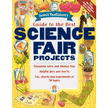 Psssst!
Psssst!
Always ask an adult about mixing chemicals. Some things are not safe to mix.
Below are facts related to different Chemistry science fair project topics.
- Each fact is a statement containing an independent variable as well as a dependent variable. These are the two things you need in order to write your science project question.
- The statements on this page are true, but you must treat them as well as any other statement with the idea that you will determine for yourself if it is true.
Following is an example of how to turn a fact into a science fair question.
Statement: The density of an object affects its buoyancy.
Think!
![]() Two things are being compared: density and buoyancy.
Two things are being compared: density and buoyancy.
![]() Research density. What is density? Does the density of an object change? How can you determine the density of an object?
Research density. What is density? Does the density of an object change? How can you determine the density of an object?
![]() Research buoyancy. What is buoyancy? How can you tell if one object is more buoyant than another?
Research buoyancy. What is buoyancy? How can you tell if one object is more buoyant than another?
![]() Can the density and buoyancy of objects be experimentally compared? If so, do you have the materials to make this comparison? Always check to make sure that materials are available or that they can be obtained.
Can the density and buoyancy of objects be experimentally compared? If so, do you have the materials to make this comparison? Always check to make sure that materials are available or that they can be obtained.
![]() When you have selected your topic, you are ready to progress to the next step–Writing the Project Question.
When you have selected your topic, you are ready to progress to the next step–Writing the Project Question.
Facts about Chemistry
1. The density of an objects affects its buoyancy.
2. The concentration of a solution affects how well it freezes.
3. When ice melts it forms water. But when floating icebergs in the ocean melt the water level of the doesn’t change.
4. The juice of some colored fruits can be used as an indicator to test for acids and bases.
5. The rate of diffusion of a material in water is affected by the shape of the container.
6. Temperature affects the rate of diffusion of a material in water.
7. The size of microscopic holes in polymer food wrap varies with different brands.
8. Water affects the rate at which iron rusts.
9. pH affects the rate at which iron rusts.
10. The type of solute affects its rate of crystallization.
11. Temperature affects rate of crystallization.
12. Evaporation affects the rate of crystallization.
13. The amount of minerals in water determines its hardness.
14. Salt affects the freezing point of water.
15. The type of solute affects its degree of solubility.
16. Temperature affects the volume of gases.
17. Temperature affects the density of solids.
18. Heat affects the movement of molecules in a solid. (page 122 in Guide to the Best Science Fair Projects)
19. Temperature affects the adhesiveness of glue.
20. The density of ice is less than the density of liquid water.
More Later,Janice
 |
Guide to the Best Science Fair Projects |